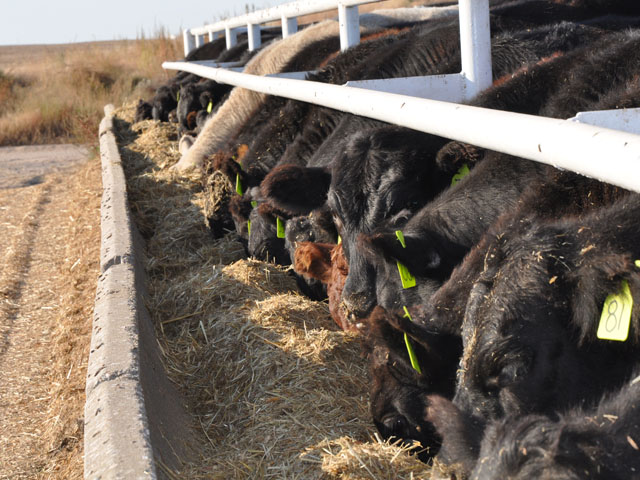Packers, NCBA Oppose Cattle Bill
North American Meat Institute Argues Packers Have Acted Fairly During Pandemic
GLENWOOD, Iowa (DTN) -- At least one cattlemen's organization and the national lobbying organization for meatpackers are pushing back on legislation introduced in the U.S. Senate to mandate higher negotiated cash trade in the cattle industry.
Sens. Chuck Grassley, R-Iowa, and Jon Tester, D-Mont., and three other senators introduced a bill Tuesday that would require large meatpackers to buy at least 50% of their weekly cattle purchases through the cash market. The senators pointed to market concentration among major packers and the spread between low cattle prices and high beef prices.
The North American Meat Institute (NAMI) responded Wednesday to questions by DTN, stating that the COVID-19 pandemic "has created great market uncertainty and caused unanticipated slaughter disruptions" that have hit beef producers especially hard. Still, NAMI said "numerous studies," including one commissioned by USDA, show marketing agreements between packers and cattle producers "help provide consumers with affordable, reliable, and consistent meat products -- to the benefit of livestock producers and packers."
NAMI added, "An action by government forcing packers to buy half their cattle on the spot market would distort the market and cause further upheaval to the food supply chain during these unprecedented times."
NAMI noted USDA is currently investigating drastic price spreads between live cattle and boxed beef prices going back to a fire last summer at a Tyson Foods plant in Kansas, as well as the current price spread with the COVID-19 pandemic. Numerous state and federal legislators also have called on the Department of Justice to investigate the cattle markets as well.
NAMI added that packers rely on livestock producers for their supplies, and NAMI maintains the packing industry has acted appropriately.
P[L1] D[0x0] M[300x250] OOP[F] ADUNIT[] T[]
"We believe they (packers) have operated in the marketplace with integrity, and we are confident they have acted appropriately," NAMI stated.
The National Cattlemen's Beef Association (NCBA) issued a statement from South Dakota rancher Todd Wilkinson, chairman of NCBA's policy division. While NCBA has noted the need for more equitable markets for cattle producers, the group is opposed to mandating that packers rely more heavily on cash market trade.
"Currently, cattle producers utilize a multitude of methods to market their livestock, including the cash market. Increased price discovery will benefit all segments of the cattle industry -- that is why NCBA has been closely working with key stakeholders, industry experts, and our partners in academia to develop tangible means to meet that end."
Wilkinson added, "Any solution must not restrict an individual producer's freedom to pursue marketing avenues that they determine best suit their business' unique needs. Government mandates, like that being proposed by Senator Grassley, would arbitrarily force many cattle producers to change the way they do business. We will continue to work toward a more equitable solution and invite Senator Grassley, and other lawmakers interested in this conversation, to join us in the search for an industry-led solution based in free market principles."
Sen. Mike Rounds, R-S.D., one of Wilkinson's senators, is a co-sponsor of the Grassley-Tester bill. Going even further, Rounds and Tester also introduced a resolution in the Senate on Wednesday calling on Congress to reinstate country-of-origin labeling for beef products as well. Sens. John Thune, also of South Dakota, and Steve Daines of Montana, both Republicans, also signed on the resolution with Democratic Sen. Cory Booker of New Jersey.
On the cash markets bill, other cattlemen's groups support the 50% mandated cash trade legislation. R-CALF USA stated the group is grateful senators are taking action to fix broken cattle markets.
"The largest beef packers have progressively shifted large numbers of cattle out of the competitive cash market and into contract arrangements where no price discovery can occur," said Bill Bullard, R-CALF's CEO. "However, the beef packers continue tying the price they pay for their contracted cattle to the razor-thin cash market that is no longer capable of establishing a competitive price for cattle."
Bullard noted consumers right now are paying near-record to record beef prices while producers are receiving depressed prices.
Choice boxed beef prices on Wednesday fell $9.40 to $465.99 per cwt, though prices throughout late April and early May are at levels never seen before. The June live cattle contract hit its high in January and is down 21% since then. It closed Wednesday at $93.87 per cwt.
The U.S. Cattlemen's Association (USCA) has been championing a 30% negotiated cash trade for every major packing plant in the country as well. More than 4,400 producers and organizations signed on to the group's petition to push for a higher mandated cash trade for packers. USCA has made a push to focus on the cash trade as the Mandatory Price Reporting law that packers must follow is set for reauthorization at the end of September.
USCA sees a change in the price-reporting law as one of the opportunities to make significant reforms in the live cattle trade.
"As Congress and industry stakeholders work together on needed changes to the program in the months ahead, we expect this bill will play a large role in those conversations," said Brooke Miller, USCA's president.
Chris Clayton can be reached at Chris.Clayton@dtn.com
Follow him on Twitter @ChrisClaytonDTN
(c) Copyright 2020 DTN, LLC. All rights reserved.



